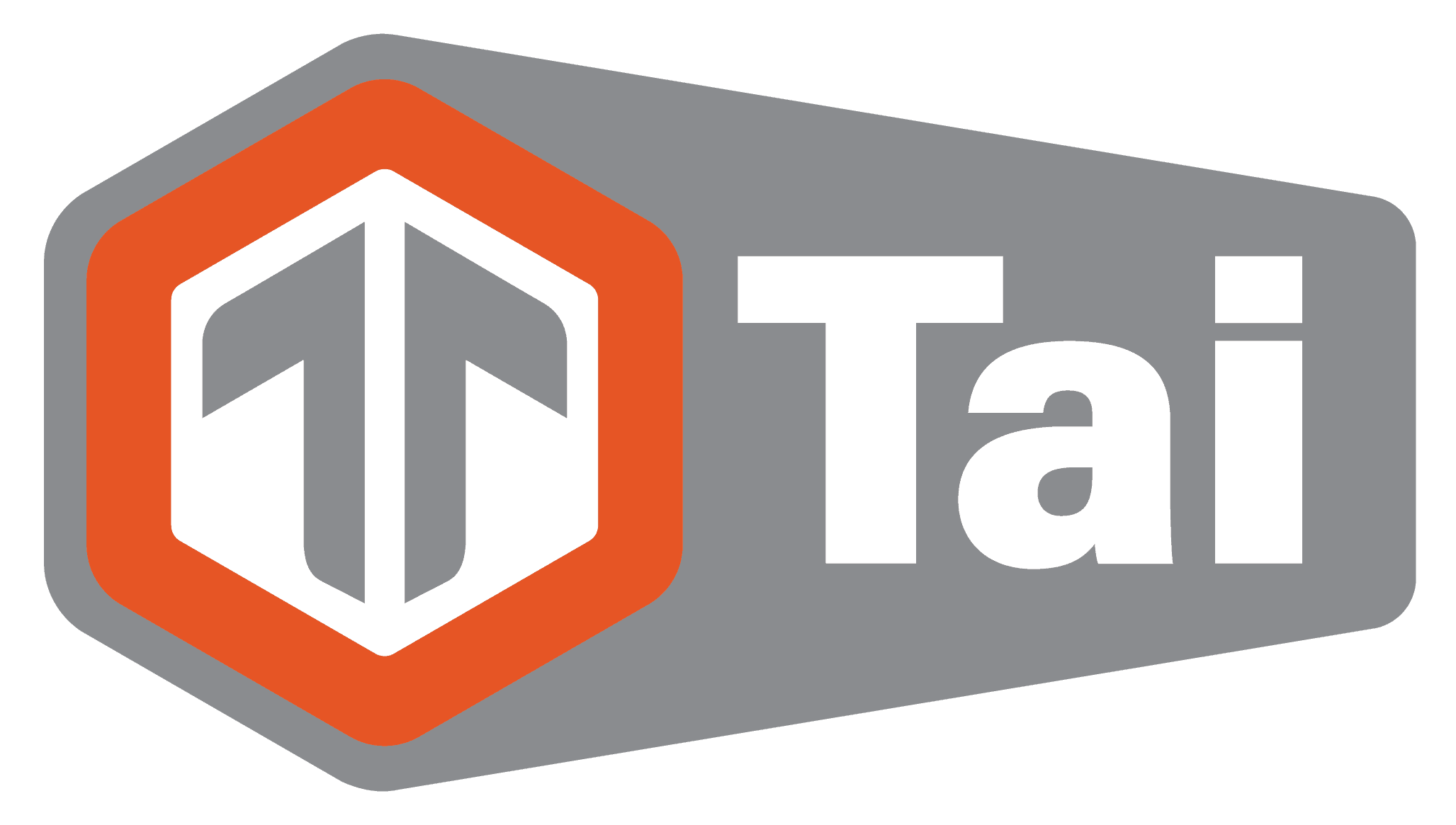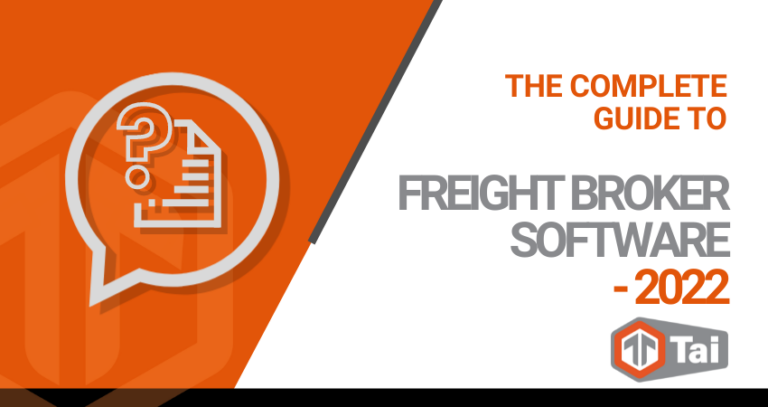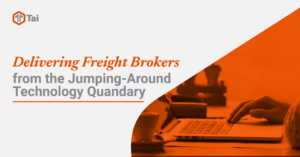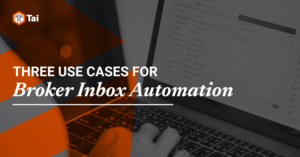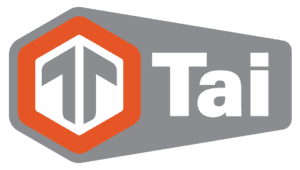Freight broker software is an invaluable tool for the modern freight broker. It helps provide automation to a historically manual process of helping shippers find the safest and most economical way to move freight from their point of origin to their destination.![]()
To have success in today’s highly competitive business environment, freight brokers must possess both the necessary skills and modern technology to get the job done quickly and effectively. The ability to connect and inspire shippers to work with you is the heart of any freight brokerage business. In some cases, they may also be outsourcing part of their logistics chain and you need to convince them of the value of doing business with you. A good salesman with the necessary freight knowledge can win the opportunity but maintaining the business requires efficient processes and modern technology that help provide the best customer service.
Successful freight brokers’ dependence on technology is not something new. However, state-of-the-art technological solutions have become critical for freight brokers to remain competitive. By embracing such unique programs and software and knowing how to leverage their rating, scheduling, tracking, tracing, and automation capabilities will ensure that your business will be on the right track. If you’re relying solely on your phone, fax, or email, you will have a much harder time maintaining core work hours. Freight management programs will help you in 2022 and beyond.
The Evolution of Freight Focused Transportation Management Software
Freight broker software programs came about around the time freight brokers began upping their game. As transportation management software (TMS) technology began to move beyond simple, one-for-one transactions, the amount of data ready to capture also began to grow. Also, the fact that many TMS platforms began moving into the cloud, also changed the game. These changes resulted in a system capable of gathering all of that information and automating all sorts of repetitive and tedious manual tasks that, otherwise, took an incredibly long amount of time. This is where freight broker software comes into play by helping both freight brokers and their customers.
What Is Freight Broker Software?
As their name would suggest, freight broker software is transportation management software that is specifically oriented towards freight brokerage operations. These solutions are meant to streamline the freight broker’s operations such as quoting, sourcing and qualifying carriers, entering loads, dispatching drivers, paying carriers, invoicing customers, and more. These types of solutions can also be customized to handle the individual and unique needs of each freight broker, based on their size and other such requirements. Among these customizations, we can include pretty much everything from tracking fuel taxes, trucking dispatch, payroll to the drivers, planning routes, monitoring driver logs, conducting routine maintenance on vehicles, and more.
Just like freight forwarding solutions, freight broker software will provide numerous technological advantages to users as they will assist shippers with their freight that’s ready to haul by finding the right carriers who are qualified to manage their load. These brokerage software solutions will provide numerous automation opportunities in areas such as:
- adding cargo to the system
- searching for suitable transport capable of handling loads
- invoicing
- real-time cargo tracking
- automatic updating of cargo status
- fuel tax tracking
- electronic documentation information
- route planning
- accounting
- transport management
Main Features of Freight Broker Software
There is a large number of freight broker solutions on the market, each with its different functions. It’s, therefore, important to choose one that’s capable of seamlessly suiting with your own company’s needs and daily operations. There are several features that most of them should have in common. These will include the following:
- Load Management – You will be able to view, organize, track, and update your load tracking throughout the load cycle. The software should display information regarding your loads by customers, load statutes, drop dates and times, drivers, carriers, the equipment being shipped, and more. The freight broker software should also allow you to sort your loads based on several criteria such as customers, carriers, drivers, reference numbers, city, state, or other keywords.
- Quotations – The software will also need to generate and send quotes for any of your modes of transportation. Track the status of quotes and convert them into orders whenever it’s necessary. Typically, you will also be able to include ad-hoc quotes, email templates, generate shipping rates, one-click shipment generation, and more.
- Routing and Dispatching – You will also be able to find more time- and fuel-efficient routes for your shippers by analyzing maps, speed limits, modal limits, traffic information, weather forecasts, and fuel costs in real-time. With this type of data, shippers will be able to determine which will be the best carriers for each of their deliveries and help consolidate their shipments into more efficient loads.
- Invoicing – Freight brokers will be able to handle their shipping and road, rail, air, or sea freight by creating the necessary document details that are owed to their shipping partners, agents, customers, and more. Most systems will be able to handle primary accounting needs, such as multi-currency payments and other automated accounting needs.
- Document Management – Receive, maintain, and archive all data, files, and other documents digitally. You will also be able to customize templates and generate new documents such as putting metatags on documents for easy indexing, search and retrieval, adding various security and access features to different teams and staff members, and sharing documents internally and externally.
- Electronic Data Interchange – Facilitate the exchange of business documents from one device to another within a standard electronic format (EDI) between one or more trading partners.
Top Benefits of Freight Broker Software
The average freight broker looks to save time, money, and resources for both themselves and their customers. They will, basically, become the shipping department for a company that doesn’t look into building and maintaining one in-house. As such, brokers will have to provide value through other business expense savings. Among the top benefits that freight broker software provide to their users include the following:
Finding The Right Carriers – Professional freight brokers are well aware that different types of goods will be shipped differently from one another. Many businesses will have to rely on freight brokers to figure out the best shipping method available for their goods. A freight broker software will look over all available carrier rates and determine which is the most cost-effective way of shipping those goods. The majority of professional freight brokers will already have established relationships with various shipping contacts and can get lower rates, to begin with.
Comparing Prospective Carriers – Freight broker businesses will want to routinely conduct audits on the carriers they usually work with. These evaluations could be in terms of pricing, or shipping times, among others. Yet, this level of review will take significant amounts of time to conduct by hand. Freight broker software will, however, be capable of comparing current carrier data with carrier proposals. By putting these prices, shipping speeds, and consignment rates side by side, brokers can ensure that they will always have the best carrier possible.
Load Board Integrations – The majority of freight brokers will use some of the most popular load boards, such as TruckStop.com or Getloaded, among others. Put simply, load boards are usually referred to as freight boards and are online marketplaces where shippers, truck owners and operators, and freight brokers can post and search for loads. When using freight broker software, users will be able to post various load orders and notify you and others on the platform about what each of you is offering. By integrating with these boards, freight brokers will also be able to update their listings across multiple websites with just a click of the button.
Hosted vs. Cloud-Based TMS
Freight brokers will also have to choose between a hosted or a cloud-based transportation management system. However, this decision should not be taken lightly. Decision-makers should follow a complex process that goes from the identification of their needs to the evaluation of the products available on the market, and ensuring that the two of them match. By not properly evaluating hosted or cloud-based solutions, freight brokers may risk seeing missed efficiency-related opportunities. To ensure that they will make the right decision, brokers will evaluate the software to better understand the pros and cons of each type of solution. It should be noted that cloud-based broker focused TMS software is widely thought to be the future of the industry, as they are updated more frequently and have superior integration and automation capability.
What Is a Hosted TMS?
Hosted TMS refers to such transportation management systems that are located on the company’s property. In other words, the platform is contained within the servers of the freight broker’s hardware. All of the data is retained within the on-premise solution, which can raise the risk of disaster that can lead to the complete loss of data. Depending on the scale of the TMS, freight brokers could see only a minor disruption or experience months-long setbacks if such an issue would ever arise. Data backup is, obviously, a possibility and a high recommendation. However, these information backups will always be out of date, reflecting only the data collected during the last copy point.
By using a hosted TMS solution, brokers will also have access to certain benefits. Some of these solutions will be designed to work seamlessly with your existing legacy ERP systems. And since these solutions are located in-house, you will have tight control over all of its functions and resources. You will be able to stay on top of its maintenance, upkeep, and updates. This can be a good point for maintaining cost control over your freight broker software implementation and maintenance.
What About The Cloud-Based TMS?
Cloud-based TMS solutions leverage cloud computing technologies to move the entire platform online. In other words, both the platform and the freight broker’s data will reside in the cloud. Therefore, the data will be continuously logged between access points and the cloud itself. This information will also update in real-time, depending on the connectivity level within your facilities. As a result, the risk of data loss will decrease in comparison to hosted TMS.
Additionally, cloud-based platforms are designed with integration between different systems like load boards and carrier software. They will usually leverage the latest connection technologies, such as electronic data interchange (EDI) and application programming interfaces (API) to enable integration with companies’ legacy systems or outside tools. More importantly, cloud-based platforms are more versatile and allow for a more diverse group of functions than their on-premise counterparts.
Hosted or Cloud-Based TMS?
Deciding between the two will ultimately boil down to the freight broker’s ability to continue its operation within its current profit margins without having to risk any setbacks from its competitors. However, there are several critical benefits that cloud-based platforms offer over their on-premise counterparts:
- Less of the need to store software, hardware, services and other equipment, as well as hire more IT personnel to handle the additional systems.
- The cost of cloud-based systems will typically be less than on-premise platforms. Cloud-based solutions are also designed with scalability in mind, which means that they are perfect to level the playing field when it comes to smaller companies. They are a critical asset for small freight brokers looking to compete with larger organizations in the transportation industry.
- Cloud computing will allow for centralized access, which reduces the barriers to system use and adoption. Since these systems reside within the cloud, any user within the organization and with the necessary credentials will be able to access the data. This will help enable remote work while reducing the total amount of time spent at the desk.
- Cloud-based freight broker software will also tend to offer better security as well. And given that even the slightest data reach could result in severe consequences for the company in today’s day and age, such as governmental penalties and losing customer trust, cloud computing could help a great deal in this regard.
- This is especially true, given the fact that cybercrime is at an all-time high. Cloud-based TMS platforms will eliminate the physical security risk and empower your operations with the latest encryption protocols such as the AES 256 standard.
- The advanced capabilities that usually come with cloud-based solutions will usually empower freight brokers with more information through their significant data analytics capabilities. Thanks to the interconnected nature of the cloud, brokers will be able to leverage real-time data through the use of many algorithms and cross-sectional analyses to render the most critical metrics to ensure that your company works by the key performance indicators (KPIs).
The Features Every LTL Broker Needs
When it comes to Less-than-Truckload (LTL) freight brokers, they need to focus on scale. In today’s highly competitive business environment, calling or emailing individual carriers is outdated and incredibly time-consuming. To build their business and remain competitive, freight brokers will need to make use of automation that will connect them to their system, schedules, and routes to make everyone’s life more comfortable.
- End-to-End Automation – LTL freight brokers will benefit from automation, aside from just booking. Direct API/EDI carrier integrations will give staff members useful insights and better control over the whole shipment lifecycle. Automated dispatching and tracking will move shipments from quote to delivery without ever having to intervene manually in the process. Carrier updates will also feed directly into the platform’s activity log, allowing quick and easy access to customer updates. Automation makes way for scalability, allowing brokers to take on more shipments without actually increasing their labor costs.
- Instant Rating – Freight broker software needs to provide users and their clients access to LTL rates and a fast rate selling tool. They need to display all of their LTL rates in a single location and provide instant quotes to the customer. They will be able to access these LTL rates directly through a branded self-service company portal, increasing the overall shipment volume without actually increasing the workload at the same time.
- Shipment Visibility – Freight brokers will also need to be able to track their LTL shipments. The platform should allow them to do so directly from the shipment profile. Through direct API/EDI integrations to LTL carriers, tracking updated feeds should be possible directly from the shipment activity log. This will allow operation teams to keep a constant eye on all the shipments in transit, and will empower the customer service team to have access to on-demand updates.
The Features Every FTL Broker Needs
When it comes to managing an FTL workflow, the emphasis needs to be placed on a centralized platform capable of integrating everything that FTL freight brokers need. They should be able to create loads and source coverage from their network and sort their network by carrier preferences. Load boards should be directly integrated so that you can post loads from a single page. Carrier bids should also feed directly into the platform, which will allow brokers to quickly and automatically onboard new carriers with their details. Streamlining this process will not only provide cost savings but also scaling opportunities.
- Shipment Visibility – FTL freight brokers will also need to provide their customers with excellent great visibility over their shipments. This will help improve customer service, as well as minimize the incidence of theft. By providing you with a mobile app, the TMS system will allow this high visibility level for both the freight broker and their customers.
- Carrier Onboarding & Compliance – Brokers will also need to quickly and effectively onboard new carriers and track their compliance details to widen their network and increase their load coverage. The system will need to integrate easily with all other standard industry software and allow you to gather information quickly and effectively from multiple sources. It should also eliminate the cumbersome process and ensure that carriers are verified without adding additional strain on your workflow.
- Loadboard Integrations – Direct connection to load boards from your TMS help to speed up your process by allowing you to post to the load boards and see available equipment from one screen.
Takeaway
While most freight brokerage software should provide users with basic features to help them manage their loads, only a handful actually help brokers scale their operations and stay ahead of the competition. Tai Software is one such example that encompasses all the features and benefits as mentioned above. It’s a cloud-based solution that uses artificial intelligence (AI) to provide its users with a centralized platform that can automate the shipping and accounting process to help freight brokers scale growth.
Tai Software will analyze millions of data variables in real-time and will allow companies to increase their efficiency within the transportation and freight industry. It’s a solution that addresses every aspect of the shipment lifecycle, making it a great TMS software platform for freight brokers, 3PLs, freight forwarders, and large shippers alike. Request a free demo today!
